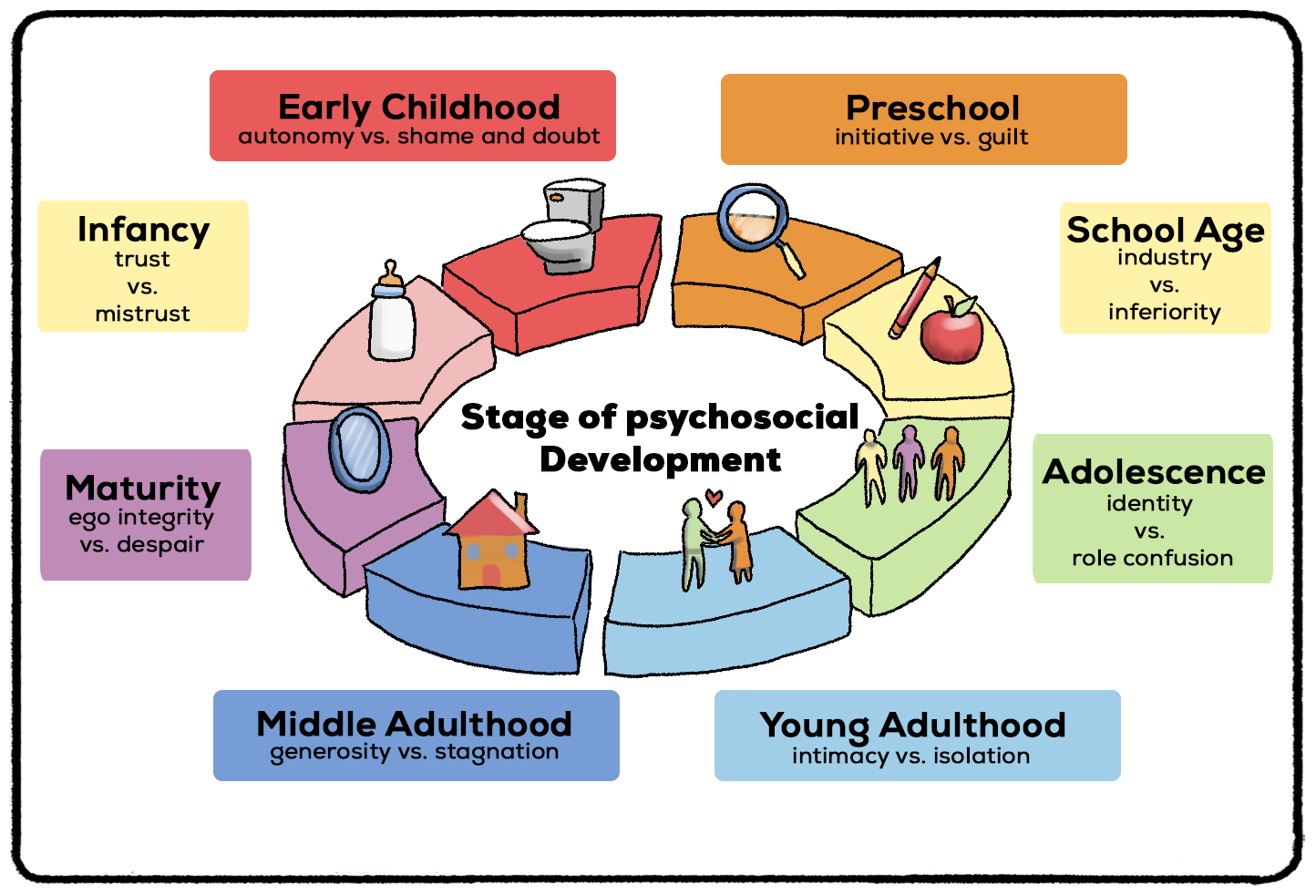Erikson's stages of Development
What is it?
Erikson's Stages of Development is a psychological theory proposed by Erik Erikson. It outlines a series of eight stages, each associated with a specific age range, during which individuals face unique psychosocial challenges. Successfully navigating these challenges contributes to healthy personality development and identity formation. These stages span from infancy to late adulthood and address issues such as trust vs. mistrust, identity vs. role confusion, and generativity vs. stagnation, among others. Erikson's theory emphasizes the lifelong process of self-discovery and personal growth.
Erikson's Stages of Development is like a roadmap for how people grow and learn about themselves throughout life. Imagine it as a series of checkpoints we pass as we age, and at each checkpoint, we face a different challenge.
Infancy (0-1 year): Trust vs. Mistrust
Challenge: Learning to trust the people who take care of us.
Example: A baby needs to feel safe and loved by their caregivers. If they are well cared for, they learn to trust others.
Toddlerhood (1-3 years): Autonomy vs. Shame and Doubt
Challenge: Developing independence while still relying on others.
Example: Toddlers want to do things themselves, like dressing or feeding. If they're encouraged, they become more confident.
Preschool (3-6 years): Initiative vs. Guilt
Challenge: Starting to take the initiative in play and learning.
Example: Children may want to explore new activities. If they're supported, they develop a sense of purpose.
Elementary School (6-12 years): Industry vs. Inferiority
Challenge: Learning new skills and feeling competent.
Example: Kids go to school, learn new things, and, with encouragement, gain self-esteem.
Adolescence (12-18 years): Identity vs. Role Confusion
Challenge: Figuring out who we are and what we believe in.
Example: Teenagers explore their interests, values, and friendships to form their own identity.
Young Adulthood (18-40 years): Intimacy vs. Isolation
Challenge: Building close relationships and connections with others.
Example: Young adults seek deep, meaningful relationships, like friendships and romantic partnerships.
Middle Adulthood (40-65 years): Generativity vs. Stagnation
Challenge: Finding ways to contribute to the world and future generations.
Example: Adults may raise children, mentor others, or engage in meaningful work or community activities.
Late Adulthood (65+ years): Integrity vs. Despair
Challenge: Reflecting on life and finding a sense of fulfillment.
Example: As people look back on their lives, they seek a sense of accomplishment and wisdom, not regret.
Each stage represents a different piece of the puzzle of growing up and becoming a well-rounded person. Successfully navigating these challenges at each stage helps us develop a healthy sense of self and build meaningful relationships along the way.
Erikson's Stages of Development can be related to various principles and scientific topics in psychology and related fields. Here are these connections:
Attachment Theory (Bowlby): Erikson's first stage, Trust vs. Mistrust, aligns with attachment theory. Establishing trust in caregivers is crucial for healthy attachment, which influences emotional development.
Piaget's Theory of Cognitive Development: Erikson's stage of Initiative vs. Guilt corresponds to Piaget's ideas about the active exploration and initiative-taking of children during early childhood.
Self-Determination Theory (Deci & Ryan): Erikson's stages, particularly Identity vs. Role Confusion, relate to the concept of autonomy and the need for self-determination in identity formation.
Psychosocial Moratorium (Eichorn and Furman): Erikson's exploration of identity crisis in adolescence is akin to the concept of a psychosocial moratorium, where young people have the opportunity to explore various roles before committing.
Social Identity Theory (Tajfel and Turner): The development of identity in Erikson's theory aligns with the principles of social identity theory, which explores how group memberships shape an individual's self-concept.
Generativity Research (McAdams): Erikson's concept of generativity in midlife corresponds to research on generativity by McAdams, focusing on how individuals seek to contribute to the well-being of future generations.
Ego Integrity vs. Despair (Peck): Erikson's late adulthood stage of integrity vs. despair relates to Peck's concept of ego integrity, emphasizing the reflection on life experiences and achieving a sense of fulfillment.
These references demonstrate how Erikson's Stages of Development intersect with various psychological theories and concepts, providing a comprehensive framework for understanding human development across the lifespan.
References
- Bowlby, J. (1969). Attachment and Loss: Attachment (Vol. 1). Basic Books.
- Piaget, J. (1952). The Origins of Intelligence in Children. International Universities Press.
- Deci, E. L., & Ryan, R. M. (1985). Intrinsic Motivation and Self-Determination in Human Behavior. Plenum Press.
- Eichorn, D. H., & Furman, W. (1983). Adolescence and Developmental Crisis. In P. B. Baltes & O. G. Brim Jr. (Eds.), Life-Span Development and Behavior (Vol. 5, pp. 191-232). Academic Press.
- Tajfel, H., & Turner, J. C. (1979). An Integrative Theory of Intergroup Conflict. The Social Psychology of Intergroup Relations, 33(47), 74-90.
- McAdams, D. P. (2001). Generativity in midlife. In E. L. Idler & L. Angel (Eds.), Handbook of Aging and Mental Health (pp. 3-23). Springer.
- Peck, S. C. (1987). The Further Evolving Self: Generativity and Integrity in Later Life. In S. H. Qualls & N. Abeles (Eds.), Psychology and the Aging Revolution: How We Adapt to Longer Life (pp. 77-107). American Psychological Association.
